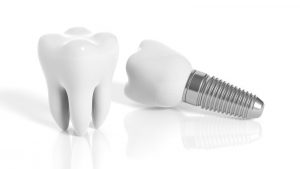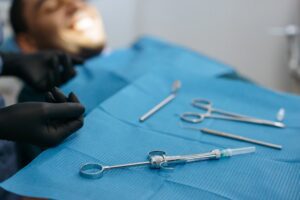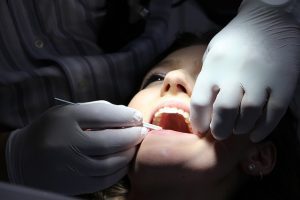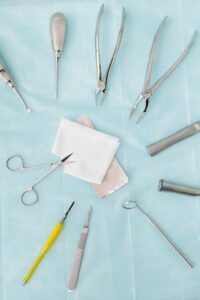Losing a tooth is never fun — no matter what age you are. Fortunately, there are a number of methods to replace teeth. Your best option to replace teeth depends on your budget and care needs. What you should absolutely not do is just ignore it. Missing teeth that aren’t replaced can lead to jaw displacement, as well as cause your remaining teeth to become crooked, and they increase chances of tooth decay, too.
So what’s your best option to replace missing teeth? Let’s look at a few of the most common solutions:
Dental Implants for Holistic Tooth Replacement
This is probably your best option for tooth replacement, because a dental implant looks and functions so similarly to a natural tooth. Dental implants are a permanent solution that you never have to remove to clean, and if done right and taken care of, will last you a lifetime.
What is dental implant surgery? It’s a straightforward process. We essentially replace your tooth’s root with a metal screw that is surgically attached to your jawbone. The screws attach to a false tooth. Over a few months, the implant fuses to your jawbone to function naturally.
To be eligible for dental implant surgery, patients must have sufficient jaw health, or the implant won’t integrate with the bone. To help the body out, an oral surgeon might perform dental bone grafting at the site of the implant.
Dental Implant-Supported Bridges for Partial Reconstruction
If you are missing multiple teeth in a row, an implant-supported bridge is probably your best option for replacing missing teeth. Since replacing each tooth with a dental implant can get expensive, we instead create a dental bridge of several teeth that are then secured to your jawbone with two dental implants, one on either side.
An implant-supported bridge functions like a dental implant. It’s important to keep in mind that this is not a permanent solution and will have to eventually be replaced. Implant-supported bridges are low maintenance and high function, but since each tooth’s root isn’t replaced, as it would be with individual dental implants, it will need altered or replaced every so often as your jaw continues to change.
Tooth-Supported Bridges for Non-Invasive Restoration
A tooth-supported bridge uses existing teeth to support the bridge, rather than two dental implants. It’s a more affordable approach than a dental implant-supported bridge. First, teeth on either side of the missing teeth are filed and shaped to be able to fit the bridge to them. A crown is cemented in place on teeth that surround the missing teeth. It has the same look, function and feel as a traditional dental implant but there is no surgery required. It’s also not permanent, as the bridge will have to be replaced.
Removable Partial Dentures for Affordable Mouth Reconstruction
Probably the most affordable option for replacing a set of missing teeth is removable partial dentures. These are similar to permanent dentures, but only replace a set of missing teeth rather than all of your teeth. They’ll need to be clasped into place, removed at night, and properly cleaned. Partial dentures will eventually stop fitting and need to be replaced. And while they work perfectly for chewing and speaking, dentures of any kind take some getting used to when you first start wearing them.
All-on-4® Implant-Supported Dentures for Hybrid Tooth Replacement
For dentures to be supported by implants, you’ll usually need 4 implants on the lower denture — though the upper denture may require as many as 6 implants. This is a more stable and stronger approach than traditional dentures. People with implant-supported dentures can generally enjoy a wider range of food choices. Because they can be constructed without a palate, this approach to dentures is less bulky than traditional dentures. And though the dentures are supported with dental implants, they can still be removed for cleaning. But you still enjoy the ability to have fixed teeth.
An implant-supported denture is well-suited to patients who have suffered jaw bone deterioration. This is because the implants are inserted into the front of the jaw where the bone tends to be stronger and can readily support dental implants. All-on-4® implant dentures last longer than traditional dentures, present fewer functional issues, and help slow the deterioration of your jaw because of the set of dental implants that anchor the installation.
Resin-Bonded Bridges for Restoring Front Teeth
Also called a Maryland bridge or a Rochette bridge, a resin bonded bridge is only used to replace the front teeth. Since these teeth are only used for biting and not for chewing, they are relatively fragile. This type of bridge would not support the chewing force of the back teeth. A resin-bonded bridge consists of two wings that are attached to the abutment teeth on the tooth surfaces nearest to the tongue, and the wings are attached to the replacement tooth or pontic. This type of tooth replacement is intended for single missing teeth, since it needs to be attached to other teeth on both sides.
Narrowing Down Your Tooth Replacement Choices
What’s the best tooth replacement method for you? It all depends! You and your oral surgeon will create a treatment plan that best takes advantage of your budget and your dental insurance. The oral surgeon will take into account how many teeth are missing, their placement, your overall health, and the health of your teeth, gums and jaw bone. There will also be considerations about sedation for oral surgery during the planning process, if a surgical tooth replacement solution is recommended.










